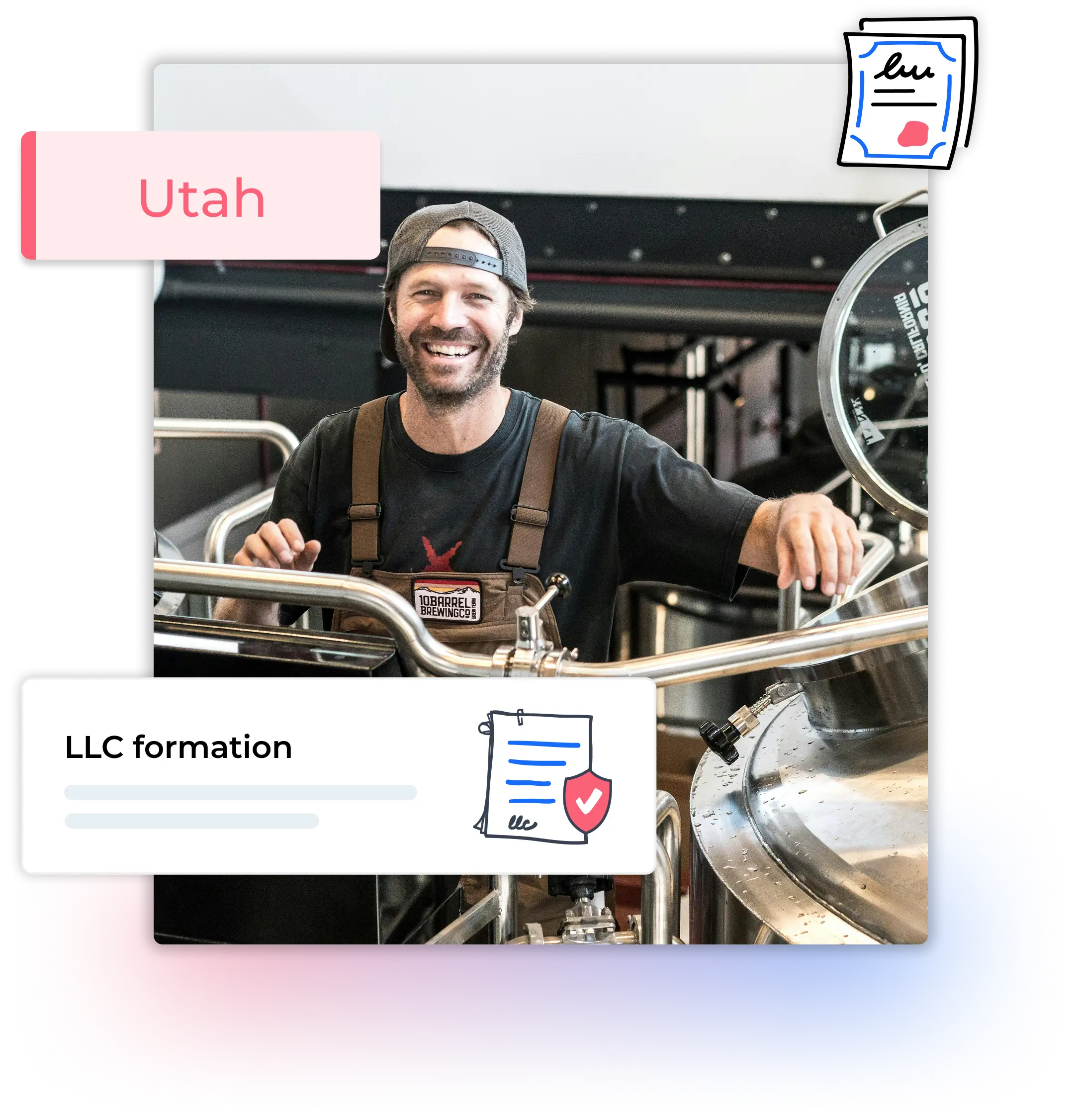Quick facts about forming an Utah LLC
| Filing Fee | $54 |
| Processing Time | 1-2 business days online, 1-2 weeks by mail |
| Annual Report Fee | $20, due each year on the LLC’s anniversary date |
| Registered Agent Required | Yes, must have a physical Utah address |
| State Franchise Tax | None for LLCs |
| Business License | No statewide general license, but many cities require local business licensing |
| Managing Authority | Utah Division of Corporations and Commercial Code |
How to start an LLC in Utah in 5 steps
When you plan to start your business, you should keep in mind any legal suits brought before your company could put your personal assets at risk. In Utah, one way to minimize the risk to these suits is to start an LLC. LLCs offer you some basic benefits, including the ability to increase the protection of your personal assets from any liability of the company. The other benefit of an LLC in Utah is you can distribute the profits in any manner you deem appropriate.
In this guide we’ll run through all the relevant information needed to get your Utah LLC off the ground in no time!
- Name your Utah LLC
- Appoint a registered agent
- File articles of organization
- Draft an operating agreement
- Get an EIN
Let’s go through each step in further detail and here is also a helpful video:
Step 1: Name your Utah LLC
Utah has specific guidelines for naming a business. These guidelines must be followed carefully to avoid having issues with the state. The guidelines are explained in Utah Business Names and Conventions Policies.
Some of the specifics about naming your business you need to know are:
- Names must be unique: You can conduct a Utah business entity search names using the Division of Corporations and Commercial Code Business Search
- Names cannot be deceptive: You cannot use certain words in your business name or indicate the business is in any way affiliated with a government agency
Step 2: Choose a registered agent
The state requires every LLC to have a registered agent. A Utah registered agent is empowered to accept deliveries on behalf of your company. In some cases, a company acts as its own registered agent. However, if your LLC operates primarily from one person’s home, uses a PO Box, or uses shared office space, your best option is to choose an independent agent. The registered agent in Utah can be an adult individual or a domestic or foreign business entity. All registered agents must have a physical address within the state of Utah.
It is also important to keep in mind that a registered agent need not receive your regular mail; their primary function is to accept documents from the state, accept receipt of court documents, and other official government documents and information. You can read more about the services of a registered agent in our post entitled “What is a Registered Agent? (And Do You Need One).” The answer is that you probably do need one if you prefer not to act on your own behalf.
Step 3: File articles of organization
To create your LLC in Utah, you will have to take certain steps first. One of the first steps you will have to make is filing a Certificate of Organization (also known as “Articles of Organization” in most states). This document must include the following data:
- Name of the LLC
- The name and address of the Registered Agent for the LLC (see below)
- The name and address of the members (owners) of the LLC
- Whether the member(s) or manager(s) will manage the LLC
- How long the LLC will remain active
The form which must be filed with the State of Utah is called the Certificate of Organization (Limited Liability Company). This form must be typewritten; it may not be handwritten.
State fees
The state filing fee for the articles of organization is $59.
Other common Utah LLC cost items that may be relevant when forming an LLC are (not necessarily required):
- DBA Registration $22
- Business Name Reservation $22
- Corporation Search $10
These fees are paid to the state and must be included with the forms. In addition to startup costs, remember that Utah requires businesses to file an Utah LLC annual report each year to remain in good standing with the state.
How to file LLC documents in Utah
The most efficient way to file your LLC documents, do a DBA filing, and get your business name reserved is by using the OneStop Online Business Registration website. This site will guide users through the process of registering and filing the necessary documents.
Other options include:
In person: The first-floor window at the Utah Division of Corporations is located at 160 E Broadway, Salt Lake City. When arriving, all documents should be ready to submit, as there are no computers or printers for public use. Payments may be made using a money order, cash, check, or credit card.
By mail: LLC registration documents may also be submitted by regular or overnight mail. The necessary fees must accompany all forms, and all forms must be typewritten (not handwritten). All checks should be payable to State of Utah. Payments are also accepted via money order or cash. The mailing address for regular mail is PO Box 146705, Salt Lake City, Utah 84114-6705. For overnight mail, the address is 160 East 300 South (or 160 E Broadway)
Salt Lake City, Utah 84111.
It should be noted that mailing and in-person registrations could take an additional 10 days for processing.
Step 4: Create an operating agreement
Operating agreements are legal documents designed to outline two things: the structure of the LLC and what each owner has in terms of responsibilities and rights. A Utah LLC operating agreement is not required by the state, but still recommended to consider.
Is an operating agreement a must?
Although Utah’s LLC regulations do not require an operating agreement, there are reasons why they make good business sense. A properly prepared document can help the owners stay focused on the business’s needs and help avoid conflict with partners in the future.
Step 5: Applying for an EIN
An EIN (Employer Identification Number) serves as a tracking number for the IRS to handle your LLC and employee taxes. As an LLC with employees, an EIN is a necessity. First, an EIN will allow you to open a bank account in your company name. Second, it will keep the funds for the LLC separate from personal funds. Applying for an EIN is painless and can be completed online in minutes. Here is the process.
- Review instructions for Form SS-4
- Review information for Single Member LLCs (if applicable)
- Apply for EIN online
It is also important to remember to keep the information for the EIN current.
FAQ
It costs $54 to file your Certificate of Organization with the Utah Division of Corporations.
Online filings are usually processed within one to two business days, while mailed filings may take up to two weeks.
Yes, every Utah LLC must appoint a registered agent with a physical address in the state.
Utah does not require an operating agreement, but creating one is recommended to outline ownership and management rules.
Yes, Utah requires LLCs to file an annual renewal every year and pay a $20 fee.
Utah does not impose a franchise tax on LLCs.
Utah does not issue a statewide general business license, but many local governments require business licensing based on your industry and location.
You can dissolve a Utah LLC by filing a Statement of Dissolution and paying the $10 filing fee.




